
Twenty years after the 9/11 attacks - a reading list
On Saturday 11 September, it will be 20 years since two planes crashed into the World Trade Center in the very heart of Manhattan. The images of smoking towers are etched into the memories of many, not only in the United States, but all over the world. September 11 became the subject of much research, but also had a major cultural impact. So much so that it became a genre of its own: The 9/11 novel. The reading list below is a selection of these works, scholarly and literary, from the collections of Leiden University Libraries (UBL).
All books in the list below come from the collections of the UBL, but are only a selection of the hundreds of books that the UBL owns on this subject. Every book is available for loan by following the link under the title or by searching our Catalogue.
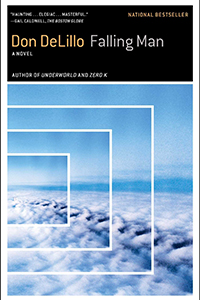
Don DeLillo, Falling Man
2007
Together with authors such as Thomas Pynchon, Cormac McCarthy, and Philip Roth, Don DeLillo is considered to be one of the most important writers of a generation in American literature. With Falling Man (2007), DeLillo wrote a novel in which 9/11 is the central theme. The title is a reference to news footage of the terrorist attacks, showing falling people who jumped from the World Trade Center towers. Simultaneously, the title refers to a character in the novel, dubbed the ‘Falling Man’, who suspends himself from buildings with a rope and a harness on, thus re-enacting the famous television footage. The central character in this novel, however, is the lawyer Keith Neudecker, 39 years old, who survives 9/11 but has to come to terms with his traumatic experiences.
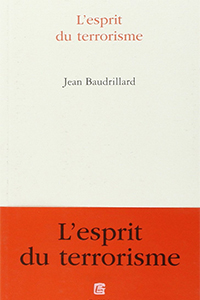
Jean Baudrillard, L’Esprit du terrorisme / The Spirit of Terrorism
2002
The French philosopher Jean Baudrillard (1929-2007) has been preoccupied his entire life with the relationship between media representation of reality and reality itself. He achieved fame with his argument that reality has been ‘murdered’: by now media representation is ‘more real’ than reality itself. His preoccupation with media representation led him to analyze global ‘events’ such as princess Diana’s death, the world championship of football, but also wars and genocides. From that interest he also commented on 9/11. According to Baudrillard, the tremendous ‘power’ of the terrorist attacks of 11 September 2001 lies not merely in the physical violence, but in the symbolism of slaughter. “What he calls the 'spirit of terrorism' is the waking nightmare of fantasy become reality, which means that in the West, we are all, whether of the right or left, now engaged in a murderous game, the rules of which are constantly being changed, not according to the globalized strategies of the western powers, but according to the inscrutable, ultimately unknowable, demands of 'the enemy',” a reviewer wrote in the New Statesman on The Spirit of Terrorism.
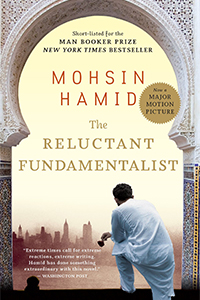
Mohsin Hamid, The Reluctant Fundamentalist
2007
The story of the ‘reluctant fundamentalis’ is the storyteller’s (Changez) monologue directed at an unknown American who has just arrived in Lahore. By following the narrator’s life story, 9/11 is placed in a transnational setting. Changez moves from Pakistan (his home country) to the United States (home to his employer) and, on off-shore assignments, to the Philipines and Chile (home to the ‘first’ 9/11). The events of 9/11 are in this way placed and investigated within a globalized context. By allowing Changez to tell his own story in a more nuanced way, tracing his steps from one extreme – being part of the globalized capitalist system– to the other –as fiery critic of US foreign policy– Hamid presents understandings and events surrouding 9/11 in a critical light and in apparent opposition to dominant Western narratives. The problematic relationship between different discourses and the tensions this creates is incorporated in an intersting manner: A Pakistani protgonist speaking in the form of a monologue, which is directed at an anonymous American listener.
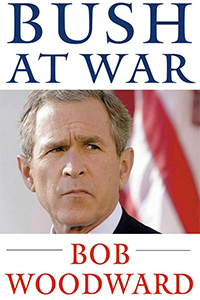
Bob Woodward, Bush at War
2002
Who was the first to attempt to write a history of the events on and directly after 11 September 2001 and the very start of the ‘War on Terror’? As early as November 2002, Bob Woodward published his chronicle of the months after the attacks, Bush at War, recounting the decision-making process in National Security Council (NSC) meetings. Citing interviews with administration officials and NSC-meeting notes as its sources, the book gave unprecedented insight into the tactical and strategic decisions that led-up to the war in Afghanistan, and foreshadows a rush to war in Iraq. Woodward’s fly-on-the-wall approach, however, has its merits and its drawbacks. His unparalleled ability to gain journalistic access to the highest levels of the executive provides unique insights, but the focus on individuals allows for little reflection or historical analysis. The book was widely lauded for its detail and candor, but also criticized from all sides of the political spectrum. Supporters of the administration criticized it for aiding and abetting ‘the enemy’, whereas opponents of the administration and the war in Afghanistan criticized Woodward for a soft approach, preserving access, and a lack of source criticism regarding interviews and notes.
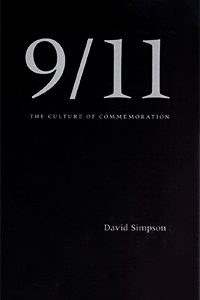
David Simpson, 9/11: The Culture of Commemoration
2006
How were the events on September 11, 2001, framed and commemorated in American public discourse? How were 9/11 and the grief it caused instrumentalized and appropriated for political gain? Scrutinizing public responses to 9/11, Simpson’s book probes the political and ideological stakes in practices of public mourning and commemoration: the popular ‘Portraits of Grief” series of obituaries in The New York Times; the contested plans for the rebuilding of the World Trade Center; the controversies around the representation of American and Iraqi dead after the invasion of Iraq, and the scandal of the Abu Ghraib torture photographs. Written from within the field of American studies as an intervention in American debates, Simpson’s book stands out for the way it introduces European continental philosophy and critical theory in these debates. The book also shows how productive a humanities-based approach can be in critically reflecting on the politics of commemoration and in working through the ‘trauma’ of 9/11.
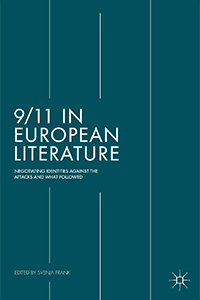
Svenja Dominique Frank (ed.), 9/11 in European Literature: Negotiating Identities Against the Attacks and What Followed
2017
This recent collection of scholarly essays stands out for its focus on the representation and overall resonance of 9/11 in European literature. How did these events and their aftermath reverberate across the Atlantic and how were they registered in European literature? How did they contribute to understandings of self and other and to consolidating, negotiating, or unsettling European and national identities? This volume focuseson the resonance of 9/11 in European national literatures (Anglo-Irish, British, Dutch, Flemish, French, German, Italian, and Polish) while also offering transnational perspectives on the European reception of 9/11. The collection puts particular emphasis on (self-)critical strands in European literature that question processes of othering, Islamophobia, and the intensification of nationalism after 9/11, and expose the Eurocentric and neocolonial assumptions that taint the purported innocence of European humanism.
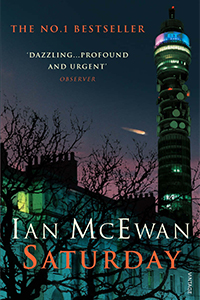
Ian McEwan, Saturday
2005
Literature’s direct and indirect responses to 9/11 were so extensive that they led scholars to pronounce a new genre: the ‘9/11 novel.’ European literature also had its fair share of contributions to this genre. Ian McEwan’s novel Saturday (2005) is not about 9/11 but offers a nuanced and complex account of the post-9/11 discursive landscape in Europe – and particularly, Britain – against the backdrop of London’s anti-war demonstrations against the 2003 invasion of Iraq. The novel focuses on the personal narrative of a middle-aged neurosurgeon whose life is disrupted by an incident that leads to the violent intrusion of another man into his and his family’s lives. Through this story, the novel stages the entanglement of the private, domestic sphere with the public – global political events in the aftermath of 9/11 – showing how the two can mirror or penetrate each other. It also broaches questions of individual’s agency vis-à-vis political events, the West’s complicity in global inequities, and the Western man’s loss of sense of mastery and control - the so-called end of “First Worldism” - after 9/11. Last but not least, the novel is also a gripping exploration of literature’s potential to intervene in political debates and to even save the day.
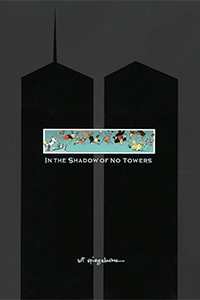
Art Spiegelman, In the shadow of no Towers
2004
The author of In the Shadow of no Towers was in Manhattan when the World Trade Center was attacked. The ten pages of this cardboard book were the author’s way of dealing with the trauma of that experience. Spiegelman uses a variety of styles and techniques to express his feelings and thoughts about his experience, without adhering to a clear narrative. This can make the comic feel disjointed from reality, almost like a feverish dream. While one comic shows his emotional reunion with his daughter, who he thought had died at her school close to the World Trade Center, another dubs George W. Bush, Dick Cheney, John Ashcroft, and Donald Rumsfeld the "Architects of Armageddon". The comic therefore should be read as an ego document, more than an accurate depiction of events or commemoration. It underscores the disorienting, absurd, and traumatic experience of being under attack by a foreign power as an American, on American soil; a condition considered inconceivable up until 9/11.
Contact your faculty liaison
Is a book missing on this list, or would you like UBL to purchase a book about the attacks or fallout of the 9/11 attacks that is not yet available in our collections? Contact our faculty liaisons.
